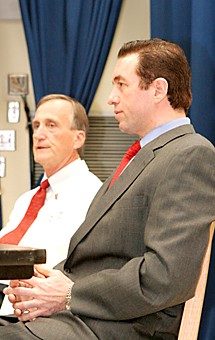On April 4, doctors at the University Medical Center performed a pancreas transplant on a 46-year-old Tucson mother who has suffered from diabetes since the age of 10. The transplant marked the reactivation of the UMC’s Pancreas Transplant Program, which has been inactive for about four years.
Dr. Ernesto Molmenti, who is a professor of surgery and chief of abdominal transplantation at the UA College of Medicine, led the surgery with the assistance of other UMC doctors.
The UMC is the only hospital in southern Arizona that performs full abdominal transplants, including replacements of the kidneys, pancreas and liver.
Although Molmenti, who was recruited from Johns Hopkins University last year, has performed numerous pancreas transplants around the country, he said his first pancreas transplant at the UMC and the reactivation of the transplant program was “”incredibly rewarding.””
Molmenti said pancreas transplants are mainly given to patients who suffer from type 1 diabetes. With a pancreas transplant, the
longevity and quality of the patient’s life is greatly enriched.
“”Most people tend to feel a new sense of well-being after the transplant,”” Molmenti said.
Jami Pond, the recipient of the transplant said she is thrilled she will be able to live her life the way she wants to, rather than planning around a schedule of insulin injections and diabetes management.
Pond said after meeting a few people who each received pancreas transplant surgery, she decided she would like to have one as well. Three years ago, Pond received her first pancreas transplant in Minnesota. Unfortunately, the transplant failed when Pond stopped taking an experimental medication.
When Pond learned that Molmenti was coming to the UA, she became the first person to put herself on the list of people waiting for a pancreas transplant.
Pond said her transplant will allow her to stop taking insulin and help her feel her best.
“”It’s just a much better quality of life,”” Pond said. “”There’s a lot to be said for being ‘normal.'””
Molmenti said pancreas transplant recipients reap many medical benefits, including the halting or even reversal of many diabetes-related health problems like poor sensation in fingers and toes, digestion problems, eye problems or a limited diet.
Molmenti said although the pancreas transplant could fail at any time, if Pond passes the six-month mark without any complications, it is likely the transplant will be successful.
“”So far, things are going very well,”” Molmenti said.









